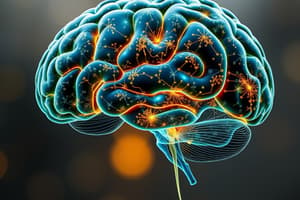Podcast
Questions and Answers
Which of the following is not a type of developmental process?
Which of the following is not a type of developmental process?
- Cognitive processes
- Biological processes
- Automotive processes (correct)
- Socioemotional processes
Socioemotional processes include changes in the child's relationships with other people.
Socioemotional processes include changes in the child's relationships with other people.
True (A)
What is a major biological change that occurs during development?
What is a major biological change that occurs during development?
Puberty
The development of the brain occurs alongside physical growth in terms of ______ and weight.
The development of the brain occurs alongside physical growth in terms of ______ and weight.
Match the following developmental processes with their descriptions:
Match the following developmental processes with their descriptions:
Flashcards are hidden until you start studying
Study Notes
Development Overview
- Development marks the continuous evolution of biological, cognitive, and socioemotional changes beginning at conception and lasts throughout life.
Developmental Processes
-
Biological Processes and Genetic Inheritance
- Involves genetic traits passed from parents to offspring, contributing to individual differences.
-
Development of the Brain
- Significant structural and functional changes occur, laying the foundation for cognitive abilities.
-
Gains in Height and Weight
- Physical growth patterns vary by age, influenced by genetic and environmental factors, critical during the early years of life.
-
Changes in Motor Skills
- Fine and gross motor skills develop progressively; milestones vary by individual but follow general age-related trends.
-
Puberty's Hormonal Changes
- Puberty triggers biological and behavioral transformations due to increased hormone production, impacting growth and sexual development.
Cognitive Processes
-
Changes in the Child's Thinking
- Cognitive development stages reflect shifts in how children understand and interact with the world, based on theories such as Piaget's.
-
Intelligence
- Intelligence encompasses various cognitive abilities, including problem-solving, reasoning, and adaptability.
-
Language Acquisition
- Rapid language development occurs in early childhood, influenced by exposure and interaction, essential for communication and social integration.
Socioemotional Processes
-
Changes in the Child's Relationships with Others
- Social relationships evolve from family-centered to peer-focused, impacting social skills and emotional development.
-
Changes in Emotions
- Emotional maturity grows over time, with children learning to understand, express, and manage their emotions effectively.
-
Changes in Personality
- Personality traits develop through interactions, experiences, and environmental influences, establishing a unique personal identity as they age.
Studying That Suits You
Use AI to generate personalized quizzes and flashcards to suit your learning preferences.




